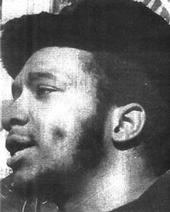COINTELPRO: The FBI's War on Black Americans
..http://www.youtube.com/watch?v=dNuudKzeW6c.. width="375" height="300" ..Fred Hampton- (August 30, 1948 – December 4, 1969)was an African American activist and deputy chairman of the Illinois chapter of the Black Panther Party (BPP). He was killed in his apartment by tactical unit of the Cook County, Illinois State's Attorney's Office (SAO), in conjunction with the Chicago Police Department (CPD) and the Federal Bureau of Investigation (FBI). Many activists consider his killing to have been extrajudicial punishment.*************************************************
************************************************************
*********************************************************You
th--
Hampton was born on August 30, 1948, in Chicago, Illinois and grew up in Maywood, a suburb to the west of the city. His parents had moved north from Louisiana, and both worked at the Argo Starch Company. As a youth, Hampton was gifted both in the classroom and on the athletic field, graduating from high school with honors in 1966.*******************************************************
**********************************************************Fo
llowing his graduation, Hampton enrolled at Triton Junior College in nearby River Grove, Illinois, majoring in pre-law. He also became active in the National Association for the Advancement of Colored People (NAACP), assuming leadership of the Youth Council of the organization's West Suburban Branch. In his capacity as an NAACP youth organizer, Hampton began to show signs of his natural leadership abilities; from a community of 27,000, he was able to muster a youth group 500-members strong. He worked to get more and better recreational facilities established in the neighborhoods, and to improve educational resources for Maywood's impoverished black community. Through his involvement with the NAACP, Hampton hoped to achieve social change through nonviolent activism and community organizing.*************************************************
**********************************************************Ch
icago
At about the same time that Hampton was successfully organizing young African Americans for the NAACP, the Black Panther Party for Self-Defense started rising to national prominence. Hampton was quickly attracted to the Black Panthers' approach, which was based on a ten-point program of a mix of black self-determination and certain elements of Maoism. Hampton joined the Party and relocated to downtown Chicago, and in November of 1968 he joined the Party's nascent Illinois chapter — founded by Student Nonviolent Coordinating Committee (SNCC) organizer Bob Brown in late 1967.*******************************************************
**********************************************************Ov
er the next year, Hampton and his associates made a number of significant achievements in Chicago. Perhaps his most important accomplishment was his brokering of a nonaggression pact between Chicago's most powerful street gangs. Emphasizing that racial and ethnic conflict between gangs would only keep its members entrenched in poverty, Hampton strove to forge a class-conscious, multi-racial (albeit tenuous) alliance between the BPP, Students for a Democratic Society, the Blackstone Rangers, the Young Lords, and the Young Patriots. In May of 1969, Hampton called a press conference to announce that a truce had been declared among this "rainbow coalition," a phrase coined by Hampton and made popular over the years by Rev. Jesse Jackson, who eventually appropriated the name in forming his own unrelated coalition, Rainbow PUSH.*******************************************************
**********************************************************Ha
mpton's organizing skills, substantial oratorical gifts, and personal charisma allowed him to rise quickly in the Black Panthers. Once he became leader of the Chicago chapter, he organized weekly rallies, worked closely with the BPP's local People's Clinic, taught political education classes every morning at 6am, and launched a project for community supervision of the police. Hampton was also instrumental in the BPP's Free Breakfast Program. When Brown left the Party with Stokely Carmichael in the FBI-fomented SNCC/Panther split, Hampton assumed chairmanship of the Illinois state BPP, automatically making him a national BPP deputy chairman. As the Panther leadership across the country began to be decimated by the impact of the FBI's COINTELPRO, Hampton's prominence in the national hierarchy increased rapidly and dramatically. Eventually, Hampton was in line to be appointed to the Party's Central Committee's Chief of Staff. He would have achieved this position had it not been for his untimely death on the morning of December 4, 1969.*******************************************************
**********************************************************Ha
mpton's funeral was attended by 5,000 people, and he was eulogized by such black leaders as Jesse Jackson and Ralph Abernathy, Martin Luther King's successor as head of the Southern Christian Leadership Conference. In his eulogy, Jackson noted that "when Fred was shot in Chicago, black people in particular, and decent people in general, bled everywhere."************************************************
**********************************************************
http://www.providence.edu/afro/students/panther/hamptonsr.ht
ml *******************************************************
***********************************************************w
ww.blackpanther.org*****************************************
***************** ***********************************************************
CLICK HERE TO GET A FREE MYSPACE LAYOUT
